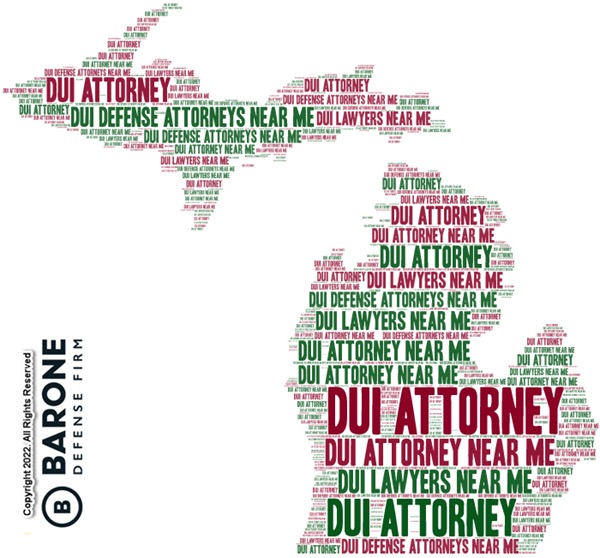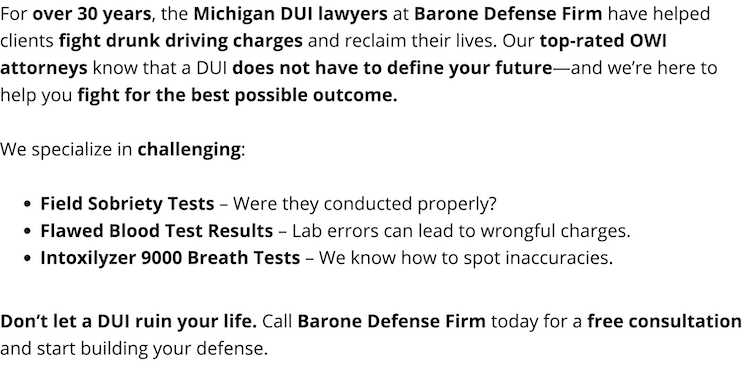OWI Charge: The State’s DUI Charges in Michigan
This article about Michigan DUI laws explains why a different acronym is used in the Great Lakes State. When "OWI Michigan" appears on a traffic ticket, this means that you are being accused of violating the State's drunk driver law (or drugged driving law).
What is OWI Charge? Across America, phrases like "DUI charges" are the usual shorthand description of driving under the influence (D.U.I.). DUI and DWI are the two most commonly used abbreviations, used by 40 or more states. When it comes to definitions, impaired driving vs DUI per se are two different things, since "per se" laws mean that you can be convicted merely from the numeric alcohol reading by being at or over the 0.08 grams % alcohol reading.
About 20 years ago, the State of Michigan opted to name the State's drunk driving Michigan statute, "operating while intoxicated," to describe the same crime under Michigan OWI laws. Under prior law, operating under the influence of liquor (called "OUIL") was the name of the crime.

In Michigan, a person can be convicted for operating a vehicle while "intoxicated" or "under the influence" of alcohol or drugs or operating by being "visibly impaired" (OWVI). Our state also has other driving impaired or intoxicated driving acronyms for variations on drunk driving, such as OWVI Michigan.
In the alternative, having any amount of a controlled substance in the driver's body can support an OWI drugs conviction. A blood alcohol content of 0.08% or more, or being materially impaired by drugs or alcohol, constitutes being "intoxicated" or "under the influence."
So, while each state's legislature gets to craft (and to "name") their laws in their own way, certain categories of drunk driving consequences and penalties will be spelled out in each state's intoxicated driving legislation. In some states' implied consent law (e.g., Georgia), a driver who refuses post arrest testing on a first offense DUI may have no mandatory jail time, while other states (e.g., Maine) will require more jail time as a mandatory criminal law penalty for any offender who refused this "implied consent" testing.
Other Driving-Related Charges in Michigan
OWVI Charge
Operating while visibily impaired or OWVI is a broader offense than Operating While Intoxicated. Impaired driving encompasses impairment by alcohol, drugs, or a combination of both. Impaired driving charges can result even if the BAC is below 0.08%. Unlike intoxicated driving, this offense focuses on the visible impairment of a person's ability to operate a vehicle.
This means that law enforcement officers can make an OWVI arrest based only on observable signs of impairment. These might include erratic driving, slurred speech, or poor coordination. A person with a very low BAC can be found guilty, provided the jury believes alcohol lessened their ability to drive to the point it was noticed by another person.
OWVI is considered a “lesser included” because these charges are usually less severe than an OWI.
OWPD Charge
If you're driving after using a Schedule 1 illegal drug, you are at risk of receiving a misdemeanor charge, which could lead to jail time. These illegal narcotics include LSD, heroin, marijuana, and other street drugs like MDMA. Except for marijuana, these drugs need only be in your system, no proof of impairment is required. Drugs pose more of a threat to yourself and others while on the road, so in some courts, penalties may be harsher.
The other driving-related charges include operating with a high blood alcohol content and the under 21 law, where the BAC has to be less than 0.02.
Explaining How Impaired Driving Michigan Laws Were Enacted
What's the Penalty for Driving Drunk? Looking at different states, DUI Michigan law will have many similarities to the laws in other states. This is because guidelines from the federal government mandate that all states enact driving while intoxicated laws that impose certain uniform OWI-DUI penalties.
So, an OWI 1st offense Michigan is comparable to a first DUI offense in Pennsylvania, or a DWI 1st offense in Texas. Three northeastern states (MA, RI, and ME) use OUI as their acronym, Wyoming uses DWUI, and Oregon calls their “driving while impaired by intoxicants” a DUII.
This short list "penalty for drunk driving" consequences if convicted, will include:
- (1) Probation, minus jail days. On an OWI in Michigan first offense, A minimum of 6 months of probation (or longer) on all offenses, with credit given for each day served in jail after arrest;
- (2) License suspension. Immediate suspension or revocation of that person's driver's license (or right to drive in the state where sentenced) on every DUI conviction;
- (3) Monetary fines. Fines that increase with each additional conviction, on any new impaired driving offenses;
- (4) Hours of community service. Sentencing that includes performing many community service hours, while on probation;
- (5) Jail time. Mandatory jail sentence for any offender whose breath or blood alcohol content (BAC) was 0.08 grams percent or more;
- (6) All states must enact "implied consent" laws. Such laws require police to notify the lawfully arrested OWI-DUI driver that his or her driving privileges will be administratively suspended if that detained arrestee refuses to give consent for her or his breath, blood, or urine to be collected by police.
- (7) These post-arrest tests are to determine the arrested driver's level of alcohol intoxication or impairment by drugs or other substances in a DUI case. If the 1st offender's BAC was below 0.17 gr. percent, and this is the person's first offense:
- Up to a $500 monetary fine;
- Serve up to ninety-three (93) days in jail;
- Perform as much as 360 hours of community service;
- Endure up to going for 180 days with a license suspension;
- Adds 6 points to a driver's license “demerit” points.
- (8) National Crime Information Center. All convictions will be reported to the NCIC in Clarksville, WV, for the federal government to keep up with "problem drivers."
- (9) Drunk driving accidents. For DWI-DUI related drunk driving car accidents, a related felony charge should be accused. For such driving charges with one or more serious injuries or deaths, NHTSA suggests felony sentences that require years in prison.
This answers one part of, "Is a DUI a felony in Michigan?" The other time you can have a felony OWI charge Michigan, is on any lifetime 3rd conviction on OWI vs DUI Michigan charges. - (10) The Super Drunk Law Michigan. For convicted drivers whose BAC was very high, then extra harsh loss of driving punishment and other consequences are to be ordered by the sentencing court. This is why a Michigan Super Drunk Law exists as part of Michigan’s state OWI laws.
OWI/OWVI Charges: What Should You Do?
If you receive a drunk driving offense, you should consider legal representation. A criminal defense attorney is especially necessary if you are severely inebriated. An attorney can help reduce your penalty, but they would need to specialize and have experience in OWI offenses.
First-time offenders in Michigan can receive up to 93 days in jail or 360 hours of community service. Vehicles can also be impounded, fines received, and licenses revoked. The higher the blood alcohol count, the longer the jail time (0.17% is considered high).
Because of the subjective nature of the crime, OWVI charges are often at the discretion of the law enforcement officer, which can lead to unfair charges.
Hiring Your Michigan Drunk Driving Lawyer With Confidence
When you need an OWI lawyer near me, contact our Barone Defense Firm attorneys. We answer 24 hours a day at our law firm's easy to remember toll-free number, 1-877-ALL-MICH or 877-255-6424, for a free criminal case review. Don’t miss protecting your right to drive by waiting until your 14 days to appeal is over!
The Michigan criminal attorneys at Barone Defense Firm travel the entire Great Lakes State, to help citizens like you who are in legal trouble for alleged criminal law violations. If you are trying to save your job and need our DUI law firm to structure a DUI attorney payment plan, just ask about one when we review your case facts.
 Barone Defense Firm Home
Barone Defense Firm Home
















